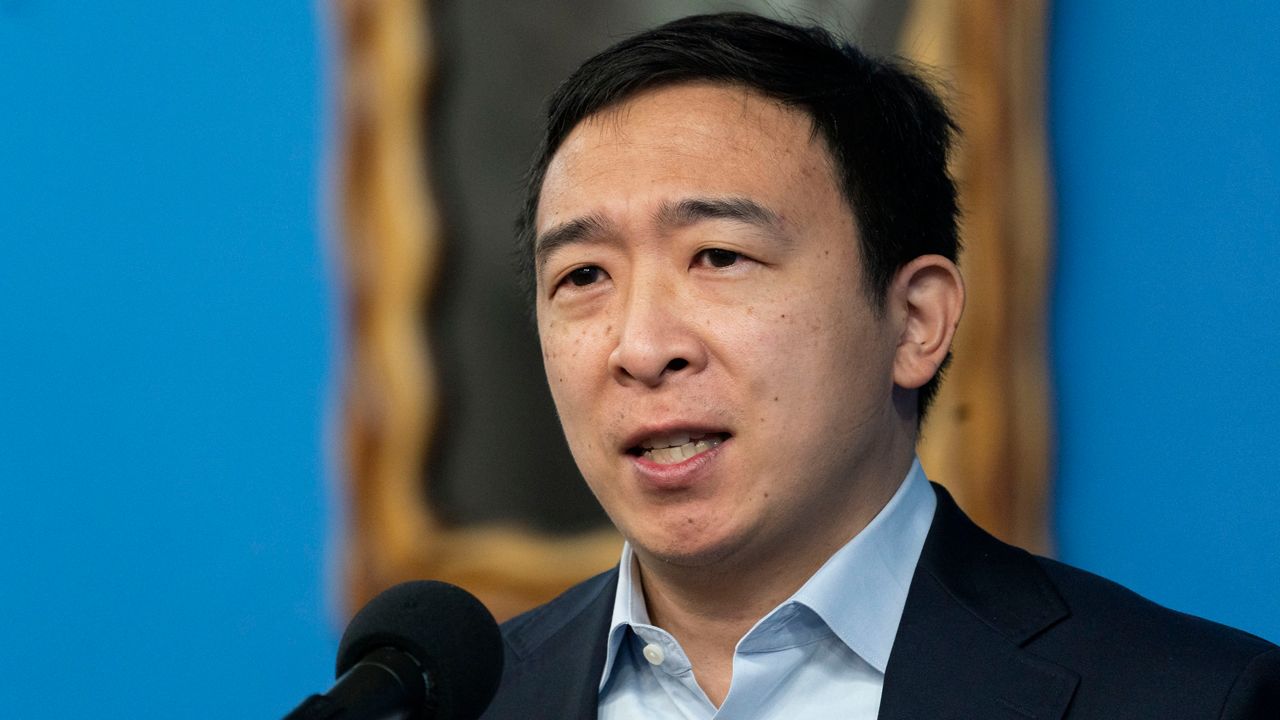“It gets late early out here.” — Yogi Berra
Remember the charmingly self-aware dorky guy on the presidential campaign trail who wore the “MATH” button on his lapel? Well, it’s time for revenge of the dorks: Andrew Yang may have figured out the political math that could make him the next mayor of New York City.
Our exclusive Spectrum News NY1/Ipsos poll shows Yang at the top of the heap of eight major Democratic candidates with 22 percentage points, trailed by Brooklyn Borough President Eric Adams at 13 points and City Comptroller Scott Stringer with 11 points. The rest of the field is stuck in the single digits. While Primary Day is just about two months away, that’s still enough time for someone to catch Yang if he or she comes up with a game plan and then executes it. Here are a few quick thoughts about where we stand as we approach the race’s homestretch:
- Although 26% of likely voters said they’re undecided in the race, that’s not so bad for Yang when those votes can be sprinkled around a feast of candidates. If the undecideds don’t coalesce around a single rival of Yang’s, he benefits by dividing and conquering.
- There is a lot of campaign cash left to be spent — which means prepare to see a lot of ads over the next two months. Our poll shows that most New Yorkers know very little about the candidates, so we could be getting some hastily-crafted TV introductions to candidates who have been stuck in coronavirus Zoom rooms since January.
- To win, you need to score points. Holding an anti-Yang press conference isn’t going to endear yourself to New York voters. Bill de Blasio succeeded in 2013 not just as a Democratic counterbalance to Michael Bloomberg, but because he told his life story to voters and came up with an agenda for the city.
- Cheerleading works. As the city is still grappling with a deadly pandemic, Yang’s gee-whiz rah-rah spirit is appealing to New Yorkers who are sick of hearing that the coronavirus has killed New York.
- The “Woke Wing” of the party may not be as large as it seems. While 22% of likely voters said in our poll that they consider themselves to be more liberal than the Democratic Party, 59% said they’re in line with the party while 18% said they’re more conservative than the party. Both Yang and Eric Adams may have an understanding that calls to “defund the police” almost cost Democrats the White House last year.
- The debates could really matter. The first debate — which NY1 will host on May 13 — could turn into a seven-on-one slugfest with Yang facing relentless attacks. But being adept with a hatchet isn’t always endearing to voters.
- Yang is still vulnerable. His penchant for making gaffes on the campaign trail hasn’t really hurt him, which could be a reflection of how voters have been desensitized after four years of Donald Trump. But the fact that Yang has never voted in a mayoral election despite living here, and has no familiarity with the local levers of power, are actual liabilities in the middle of a pandemic. There’s a reason why Joe Biden is president instead of Marianne Williamson — or Andrew Yang for that matter.
Complicating all of this is the city’s new system of ranked-choice voting for political primaries in which voters can pick up to five candidates. Previously, a candidate was required to win 40% of the primary vote or be placed in a runoff with the second-place finisher.
Before this year, it’s easy to imagine Yang getting into a runoff with Eric Adams or Scott Stringer and then seeing the Democratic establishment and the city’s civic leaders get on an anti-Yang bandwagon and derail him in the end. But without a runoff, Yang could benefit from avoiding a tough head-to-head showdown. There’s safety in numbers. And for now, Andrew Yang has figured out how to crunch them.
For more of Bob's columns, visit the NY1 Political Buzz homepage.
SIGN UP FOR OUR POLITICAL NEWSLETTER:
